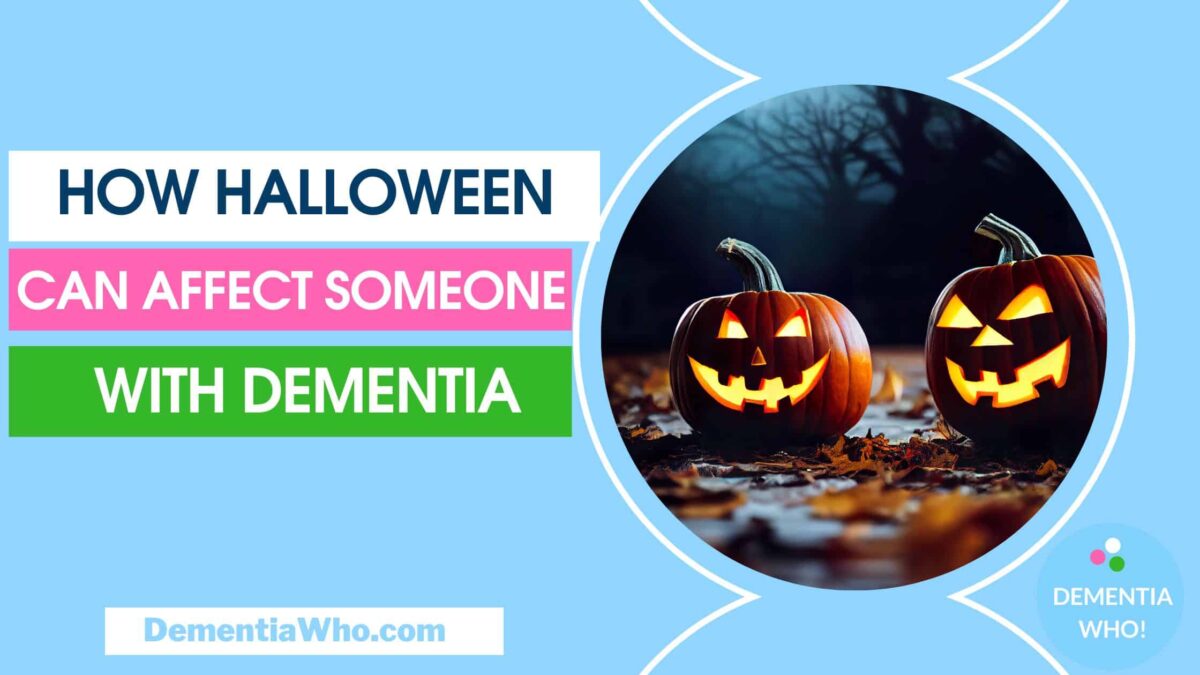
Halloween can affect someone with dementia in so many ways.
There’s the costumes & masks that can trigger fear, decorations that can cause confusion, loud noises that may increase agitation, and all of that hits as sundowning does!
Caregivers can reduce these risks by keeping decorations simple, planning shorter activities earlier in the day, and focusing on calming alternatives such as crafts, music, or handing out sweets in a quiet setting.
I learned this when caring for my mum. She loved some parts of Halloween, but the sudden knocks, spooky costumes and fireworks going off (I know, it’s not bonfire night!) were really disturbing for her.
I learned over time what to do, so this hopefully helpful article is dedicated to explaining the things to watch out for and how to make Halloween dementia friendly for your loved ones.
Why Halloween Can Be Difficult for Someone With Dementia?
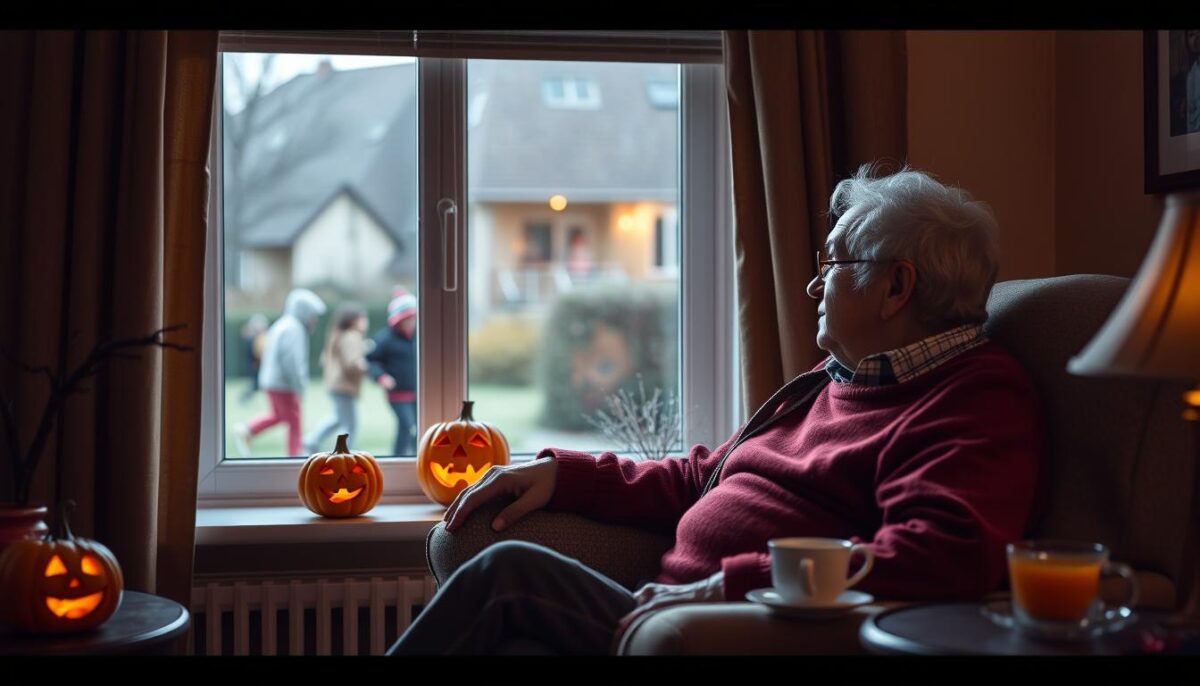
Fear & Anxiety
Costumes, masks, and sound effects can trigger fear & anxiety. This is especially true for people living with Alzheimer’s disease or Lewy Body dementia, who may already see or hear things that aren’t there experiencing dementia hallucinations.
With my mum, I noticed she sometimes mistook adults dressed in scary costumes as the real thing, you can so picture that, someone with an axe to their head and fake blood, that can seem very real & very scary!
To make Halloween feel safer, I’d suggest avoiding frightening costumes. Instead, we tried:
- Keeping the focus on fun accessories rather than full costumes, glow sticks, ribbons, or a friendly pumpkin apron etc
- Avoiding anything that covered the face because it made recognition harder and sometimes frightened her. Add lighthearted touches, like wearing matching colours as a family, so everyone feels included without confusion
- Being involved in the preparation by joining in helped reduce anxiety like doing Halloween crafts together
- Trying distraction techniques focusing on other things, like creating art, baking or reminiscing over shared Halloween stories etc Find more ideas in my Halloween activities for dementia seniors and the elderly article.
Accidents are more likely if your loved one with dementia doesn’t recognise objects, misinterprets what they are, or judges spatial distances improperly because they’re scared and move too quickly. Being involved and participating can really reduce that fear and anxiety.
If you are arranging Halloween activities for nursing home residents, I suggest keeping faces visible. Staff and family should introduce themselves clearly and avoid heavily made up costumes.
Halloween Decorations and Dementia Confusion
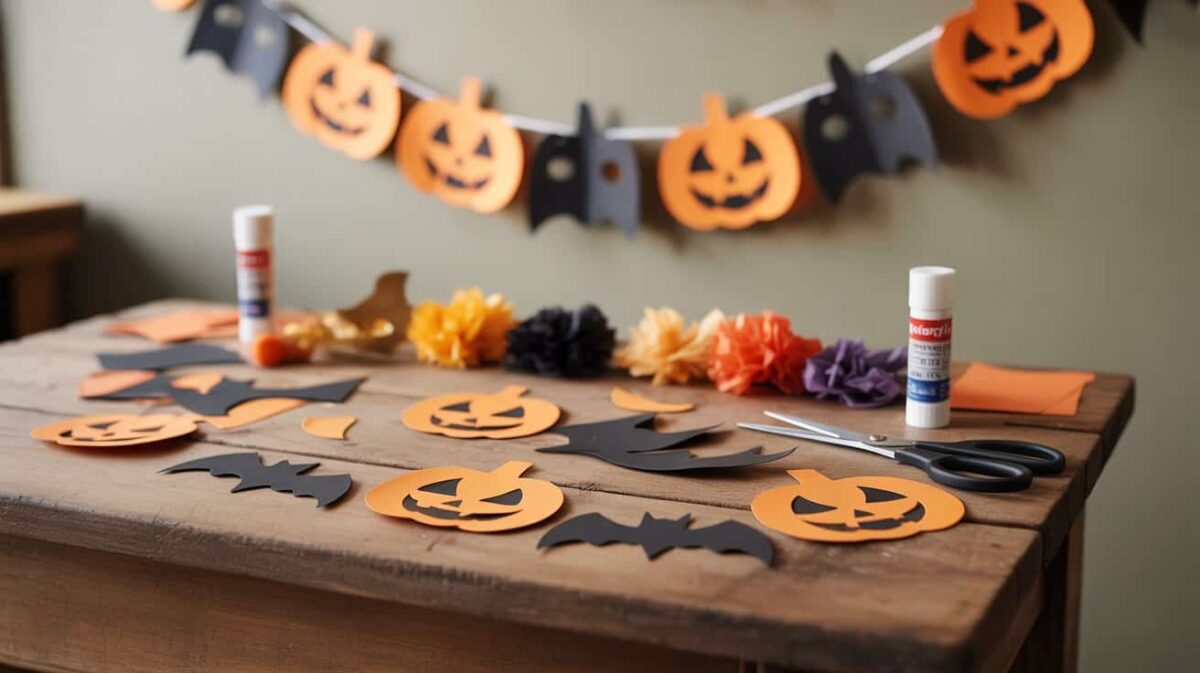
Halloween decorations can transform a familiar home into something unrecognisable & disorientating to our loved ones living with dementia.
Cobwebs, skeletons, and flickering lights may look fun to us but feel threatening to someone with dementia.
I made that mistake one year by putting up ghostly decorations with flashing lights & cobwebs everywhere.
My mum was completely disorientated by the changes in the room. From then on, I stuck to fewer simple friendlier decorations.
I also made sure she was part of the process of decorating to reduce the disorientation and confusion.
And don’t forget sounds as well, that will play an important part in reducing confusion, no spooky sounds emanating from different corners of the room!
Safer ideas include:
- We avoided anything that moved or made sudden noises, but simple, colourful items like paper pumpkins worked well
- I asked her opinion while we decorated, which made her feel involved rather than surprised by a new look in the house
- We mixed in everyday objects she recognised, like a familiar photo frame or cushion, so the space didn’t lose its sense of home
If you want inspiration, my guide to Halloween crafts for seniors has easy projects that double as decoration and activity.
Memory Loss and Halloween Activities for Seniors
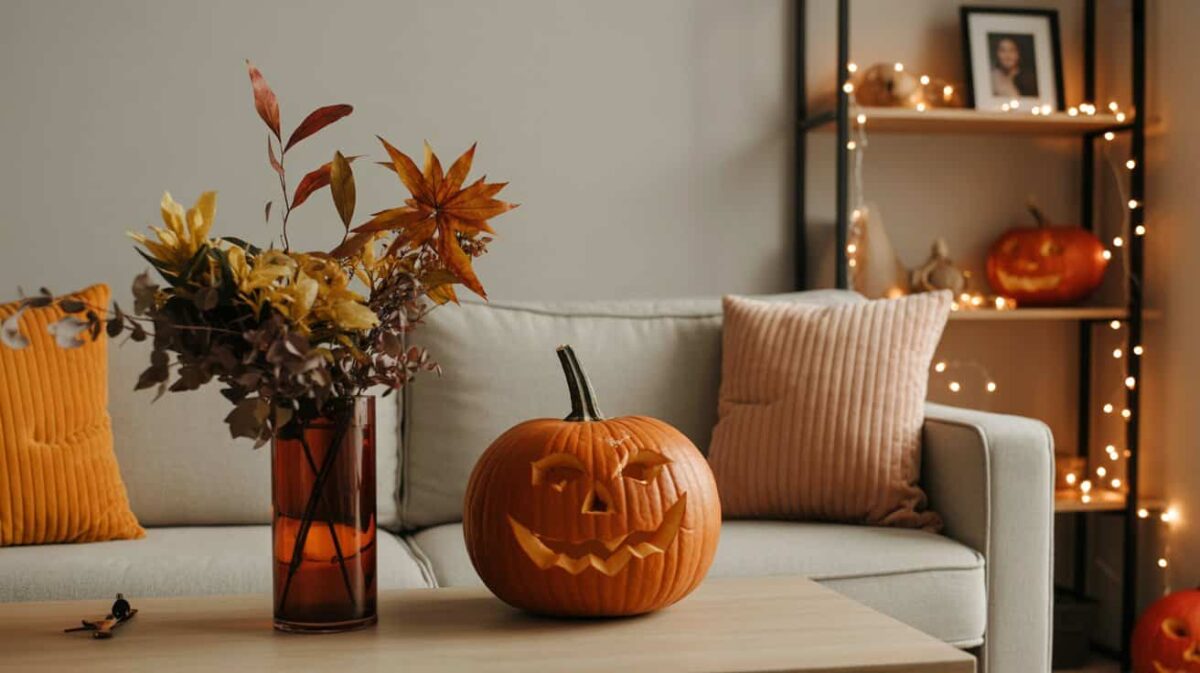
Halloween can confuse someone with dementia who already struggles with memory.
We might be doing something with mum but little details often slipped away and she became unsure of what was happening.
That just gets worse when you’re dealing with the “traffic” of Halloween.
To reduce stress, I found it helped when I:
- Introduced people by name every time, even family, so she didn’t have to struggle to name them and placed visible reminders like a note saying “It’s Halloween today” with a little pumpkin drawing in her line of sight
- Used activities with a clear beginning and end, like a short round of bingo or finishing a small craft, so she knew when something was complete
- Brought out familiar objects alongside new ones, an old blanket on her chair, giving her that favourite mug, reassuringly familiar or pulling out an old photo album book and looking at Halloween pictures from before.
- Created a “Halloween memory table” with safe, familiar seasonal items, a bowl of apples, a soft scarf in autumn colours, a few old photos, familiar jewellery, so she could touch, look, and recognise them throughout the day.
These little things made it easier for mum and it may be a useful technique for you to try to reduce confusion from memory issues.
Short Attention Spans and Overstimulation
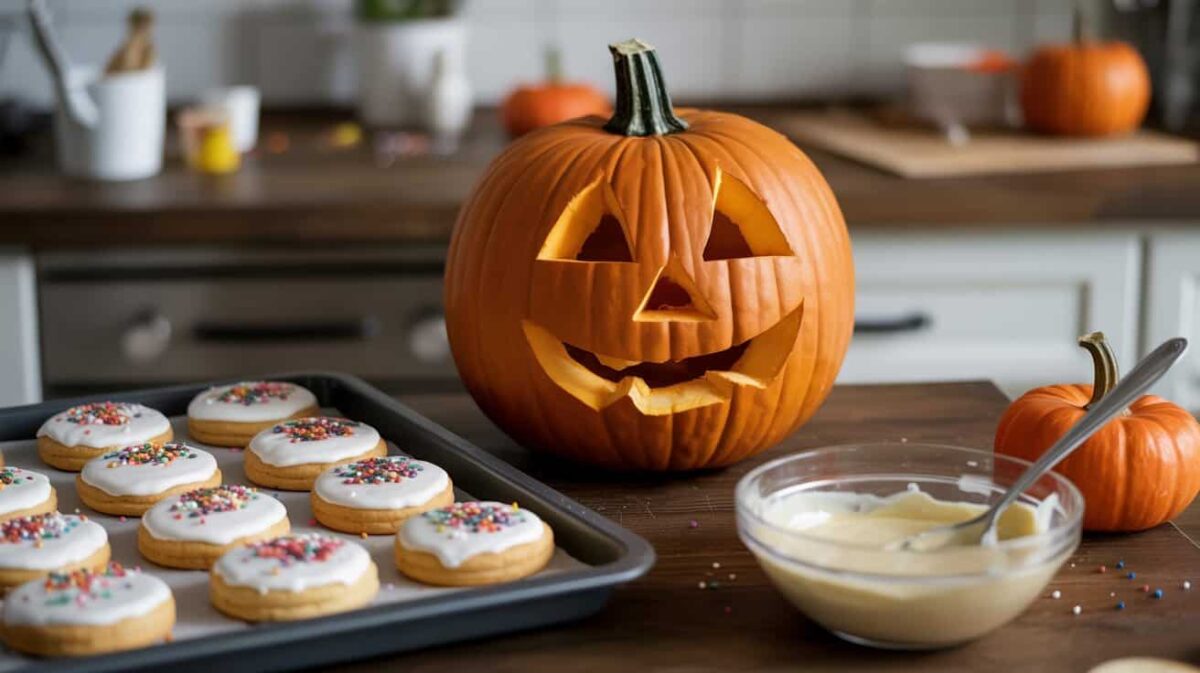
My mum, with mid-stage Alzheimer’s, has an attention span that varies during the day. She’s more responsive in the mornings, and later in the day she tends to be more tired and easily irritated.
Long parties, noisy gatherings, or crowded rooms can easily become overwhelming.
For that reason, I’d advise to keep Halloween activities for elderly loved ones short and simple:
- Painting a pumpkin in ten-minute sessions
- Decorating baked biscuits with icing and sprinkles rather than baking from scratch
- Small competitions such as spoon apple bobbing
- I also paired her with a family member so she never felt left out or was left alone.
When she needed a rest, we took a break together and came back later. Having a quiet space available was essential.
Keeping activities short meant my mum could enjoy them without feeling drained.
For more adaptable ideas, I’ve collected them in Halloween activities for dementia seniors and the elderly or if you’re looking for games, check out this article: Halloween games for seniors
Sundowning and Evening Halloween Events
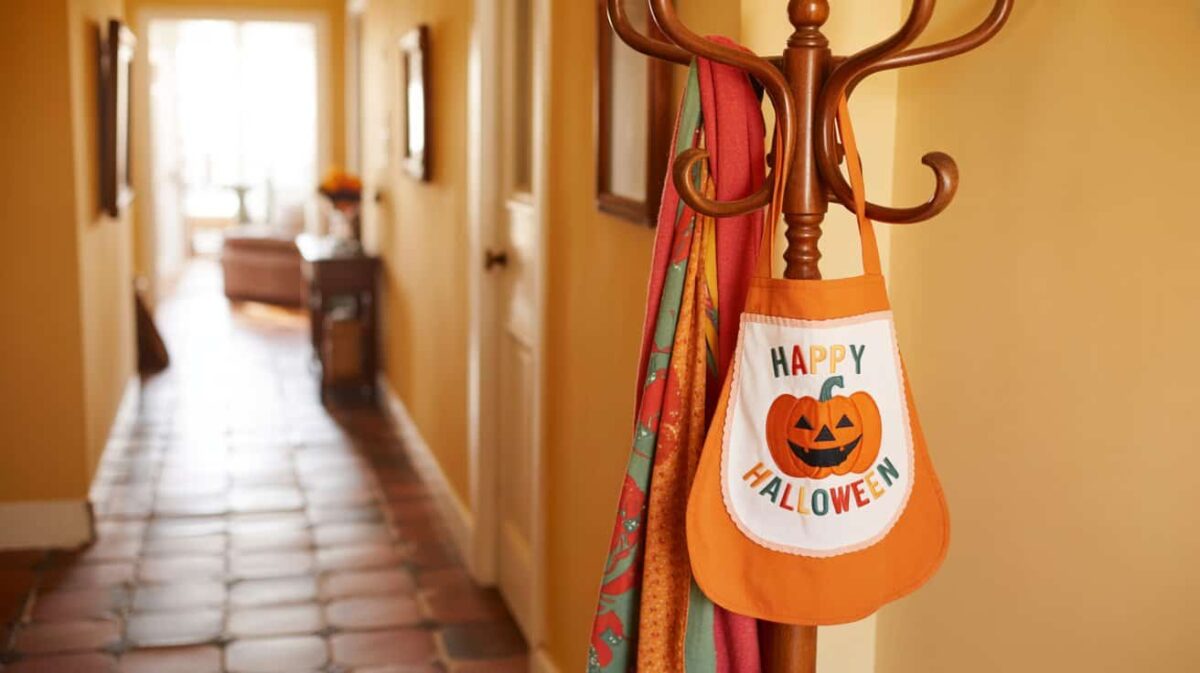
Evening was always the trickiest time for my mum. Sundowning often made her restless and unsettled.
Sundowning can bring confusion, restlessness, and agitation. Add Halloween noises, costumes, and flashing lights, and the stress multiplies.
My solution was to shift celebrations earlier.
- Holding a small tea party in the afternoon with pumpkin cakes or biscuits instead of a late-night gathering
- Playing light-hearted music before dark, which gave her a sense of celebration without the stress of evening noises
- Watching an old film together in the late afternoon, so we still marked the day but kept it calm
- Creating a “wind-down basket” with calming items like lavender hand cream, a favourite blanket, or a soft cuddly toy
In care homes, I would suggest planning senior Halloween activities during the morning or early afternoon, then letting the evenings stay quiet.
Making Halloween a daytime event changed everything for us. My mum could join in without feeling unsettled, and she ended the day more relaxed.
Environmental Triggers During Halloween
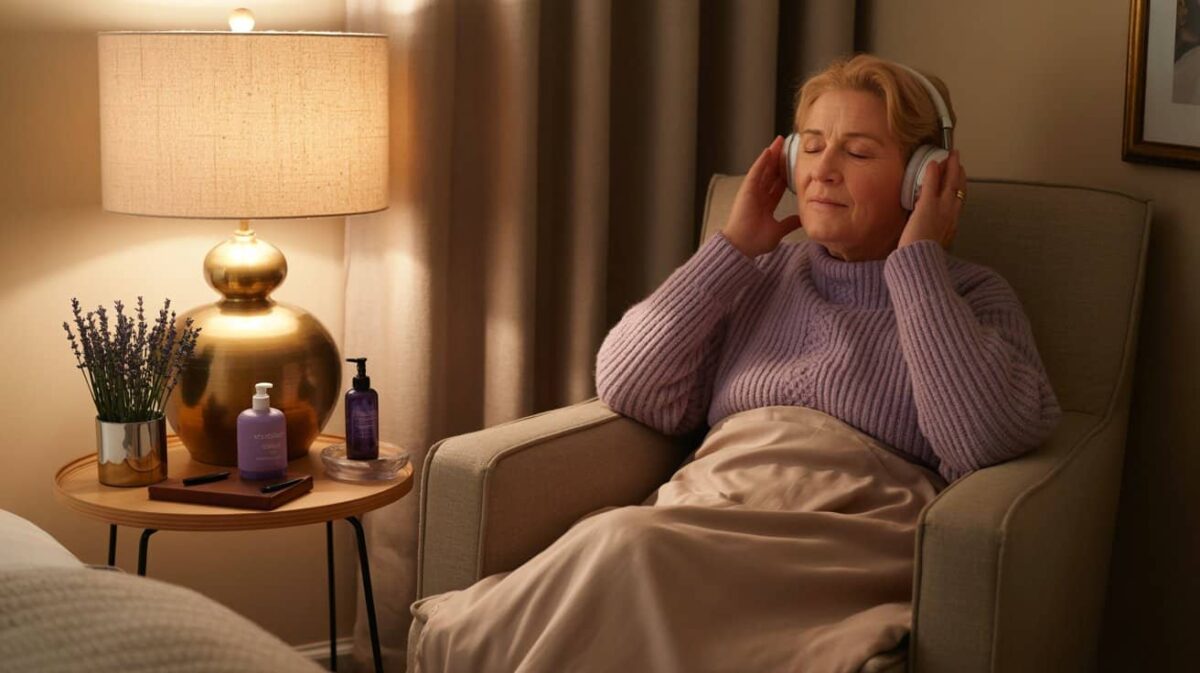
The environment, the constant knocks at the door, shouting trick-or-treaters, and fireworks outside your home, all of it can add to the stress for someone living with dementia.
At home, I learned to keep things calmer by planning ahead:
- Assigning one person to answer the door (or avoid interruptions all together by hanging a No Trick & Treat Sign
- Having a quiet room in the back where we could play reassuring and comforting music, and if the fireworks became too bad, a set of headphones to drown out the sounds
Creating a quieter “end to the evening” ritual once things outside had calmed down, chamomile tea and watching an old movie to relax
In care homes, the challenge can be too many visitors or activities at once. Smaller, quieter celebrations are usually best or having a designated quiet area will help.
For more advice, I’ve shared specific strategies in 13 tips for a safe Halloween for dementia caregivers and last-minute Halloween safety tips for seniors with dementia.
Preparing for Halloween in Dementia Care
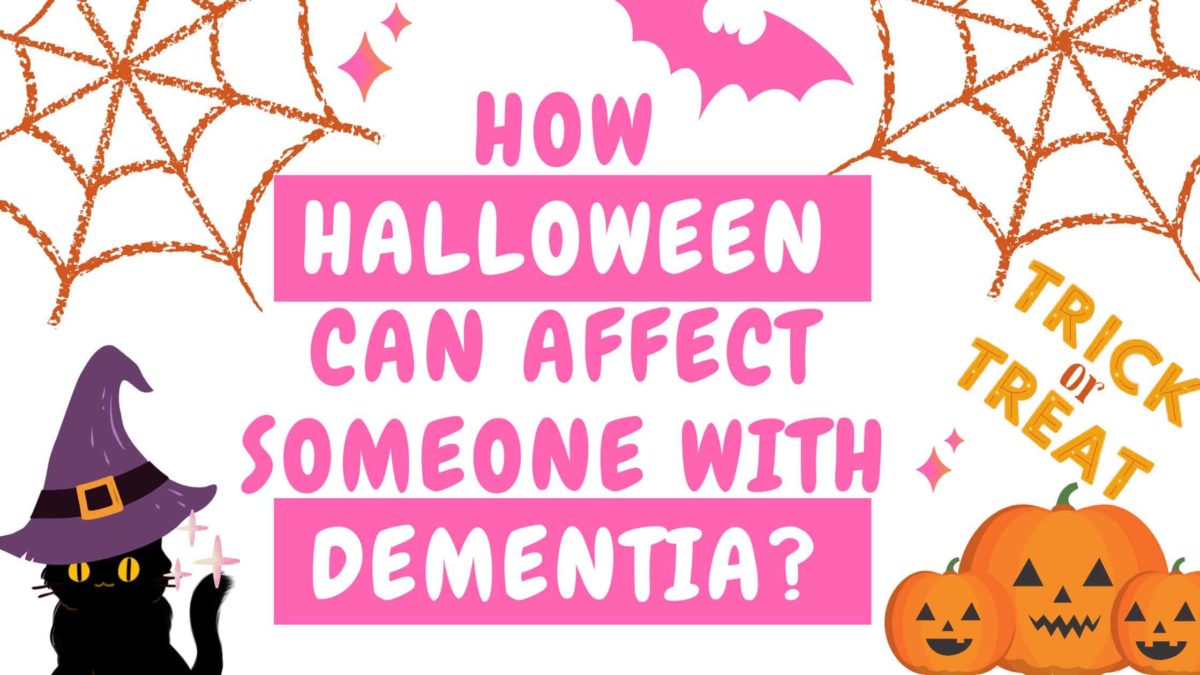
Preparation makes all the difference. Instead of reacting to stress in the moment, plan ahead for what you know works.
Ask yourself what are the likes and dislikes of your loved one with dementia. For me, I asked does my mum cope better in the morning or evening? Does she like decorations, or do they unsettle her? Does she enjoy group activities, or does she prefer one-to-one time?
That helped me put together practical steps like:
- Talking about Halloween early, using photos of pumpkins or decorations to gently remind her it was coming, so it didn’t feel like a surprise on the day
- Building a mini schedule, noting the best times of day for her concentration and planning any activities, like crafts or games, during those hours
- Choosing one or two reliable activities we could repeat each year, like painting a small pumpkin or adapting games to match her ability, such as larger-print bingo
- Preparing a “comfort basket” with her favourite blanket, snacks, and a soft activity like large-piece puzzles, ready to use if she became unsettled
- Setting up a calm retreat room to move into when needed
If you’re short on time, I’ve listed some quick wins in my last-minute Halloween safety tips. And for the fall in general, you can use my fall caregiver checklist to get organised before winter arrives.
Positive Halloween Activities and Alternatives
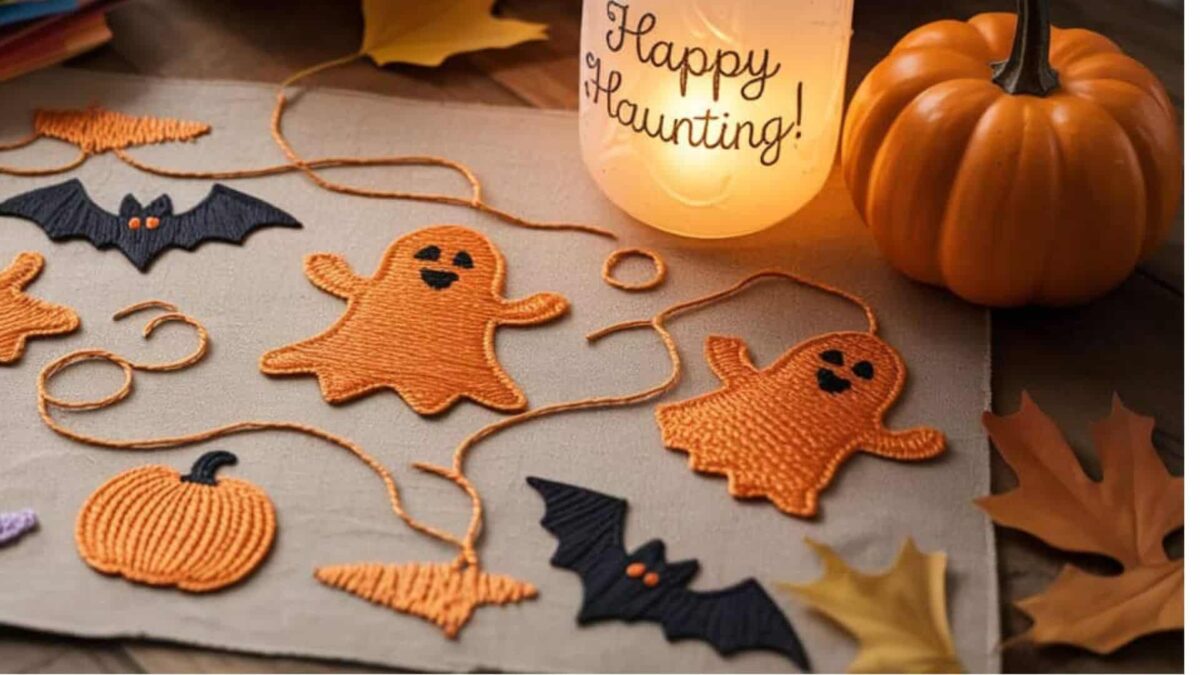
Halloween doesn’t have to be frightening. There are plenty of safe and fun activities for seniors and people with dementia.
I found that focusing on creative or social activities worked best. My mum enjoyed the process more than the finished product, so the fun was in doing it together.
- Crafts: Simple projects like painting pumpkins, making autumn wreaths, or creating a friendly “autumn photo wall” with family pictures, orange and brown paper leaves, and safe decorations that build a sense of the season. See my guide to Halloween crafts for seniors for more step-by-step ideas.
- Games: Word searches, themed bingo, and guessing games all work well. For something different, try a “pumpkin treasure hunt” indoors, hide paper pumpkins with easy clues or small treats attached. My guide to Halloween games for seniors has more practical examples.
- Reminiscing: Ask about childhood Halloweens or favourite autumn foods. Bring out old photos or cook something from their younger years to spark conversation. Halloween reminiscing questions for seniors can also get people talking.
- Food: Decorate biscuits, bake soft pumpkin muffins, or share warm drinks. Another idea is to roast pumpkin seeds together and save some for planting in spring, giving the activity a sense of continuation.
By choosing safe, simple Halloween activities for dementia & seniors, you can still create a sense of celebration without unnecessary stress.
How to Keep Halloween Safe and Fun for People With Dementia
If you want a fast reminder, here are the steps that helped me most:
- Avoid frightening masks or costumes
- Use safe decorations like lights, wreaths, and pumpkins
- Plan short Halloween activities for elderly loved ones with breaks in between
- Celebrate earlier in the day to avoid sundowning
- Keep one person in charge of trick-or-treaters (or have a No Trick & Treat Sign up)
- Offer calming crafts and simple games, see my guides to Halloween crafts for seniors and Halloween games for seniors for more ideas
- Always have a quiet retreat space ready
- Prepare a comfort basket with favourite snacks, a blanket, or soothing activities to turn to if things get overwhelming
- End the evening with a steady ritual, like a warm drink, prayer, or favourite programme, so your loved one knows the day is finished and can relax
For more in-depth advice, see my posts on Halloween safety for dementia caregivers and last-minute Halloween safety tips.
Final Thoughts
Halloween can feel daunting when you’re caring for someone with dementia, but it doesn’t have to be. With a little preparation and a focus on safety, it can still bring moments of joy.
How Halloween can affect someone with dementia will vary for each person, but what matters most is knowing your loved one and shaping the day around what makes them feel safe.
Trust what you know works for your loved one. Keep things simple, protect them from stress, and choose the activities that bring comfort.
Happy Holidays!
